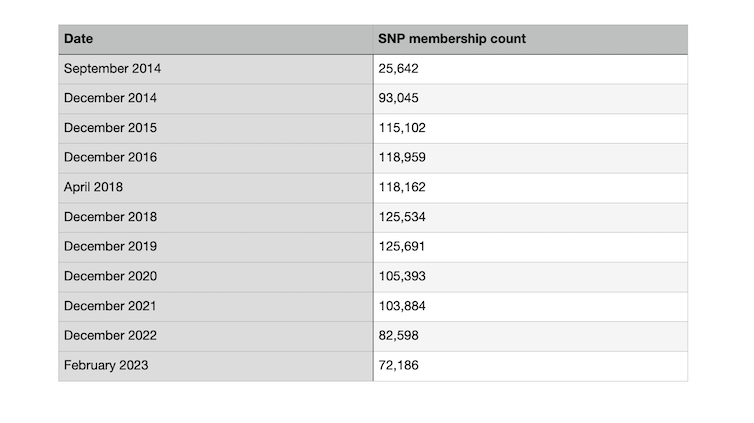Alamy/Xinhua
All that’s stable melts into air, all that’s holy is profaned, and man is ultimately compelled to face with sober senses his actual situation of life and his relations along with his type.
So wrote Marx and Engels within the Communist Manifesto. They had been speaking about how what had beforehand been taken without any consideration might be swept away by capitalism. But they could as effectively have been speaking about the way in which the competition for the management of the Scottish National Party has upended all our assumptions about that get together – not least, that it was exceptionally united and had an impressively giant and dependable rank-and-file membership.
That’s as a result of, following Nicola Sturgeon’s shock resignation, the get together has quickly succumbed to the sort of bitter ideological infighting between bold rivals that many people had begun to affiliate nearly completely with the Conservative Party south of the border.
And not solely that: in the middle of the competition, the get together has been pressured, underneath strain, to confess that it has nowhere close to as many members as the remainder of us had assumed – an admission that prompted the resignation of the SNP’s embattled chief-executive, Sturgeon’s husband Peter Murrell.
Quite why the newest determine of 72,186 members needed to be dragged out of get together HQ is, for the second at the very least, anybody’s guess. But what is definite is that it constitutes a marked drop on the 100,000-plus that was broadly quoted earlier than this newest quantity was reluctantly launched.
And it appears equally sure that we’re seeing the tip of a very phenomenal interval of grassroots development for the Scottish nationalists which started after (and possibly throughout) the 2014 independence referendum.

The rise and fall of SNP membership over time.
Author offered, CC BY-SA
The SNP, after all, isn’t the one get together within the UK to have skilled one thing of a membership development spurt over the past decade. Lots extra individuals had been prompted to hitch the Labour Party underneath Jeremy Corbyn. And, though it escaped most individuals’s discover, the Liberal Democrats attracted quite a lot of new members after they returned to opposition after 5 fairly brutal years in coalition with the Conservatives between 2010 and 2015. Meanwhile, the Tories themselves issued simply over 172,000 ballots to members in the summertime 2022 management contest received by Liz Truss, in contrast with the 159,000 or so it had issued in 2019 when Boris Johnson changed Theresa May.
Reasons for leaving
The query of why individuals be a part of political events has preoccupied tutorial observers for the reason that pioneering survey analysis carried out by teachers Patrick Seyd and Paul Whiteley within the late Nineteen Eighties – a practice constructed on extra not too long ago on by the Party Members Project run out of Queen Mary University of London and the University of Sussex.
What we’ve tended to pay far much less consideration to, nonetheless, is why members go away. This is the difficulty that ought to now be worrying the SNP, assuming that, like most political events, it welcomes not simply the legitimacy a thriving membership confers on its trigger, but additionally the cash and manpower members contribute.
That doesn’t imply that there’s been no analysis into this query. It is one we tried to reply in our e-book Footsoldiers: Political Party Membership within the twenty first Century, and which we adopted up extra not too long ago after Keir Starmer changed Corbyn in 2020 – a improvement that induced a lot soul-searching final summer time when the get together was reported to have misplaced tens of hundreds of members.
Although events typically fret (not with out purpose) about administrative failings or the price of membership and even boring or conflictual conferences driving members away, our surveys of people that’ve give up events present that none of those matter that a lot.
Instead, what prompts individuals to let their membership lapse or, extra dramatically, to depart in excessive dudgeon is a way that the get together goes within the flawed course, or adopting a specific coverage or insurance policies that they disagree with.
Our analysis additionally reveals that this ideologically-motivated distancing and detachment is commonly sure up with dissatisfaction or plain disagreement with the chief of the get together – whether or not that be the incumbent or their successor.
What is especially attention-grabbing on this regard is that the SNP’s current lack of members occurred on Nicola Sturgeon’s watch, not because of her resigning. This means that, for no matter purpose, a good few individuals had grow to be disillusioned together with her management and the course by which the get together was going.
Unfortunately for the SNP, it appears pretty doubtless – particularly given the bitterness engendered by the competition to exchange her – that whoever takes over from Sturgeon could effectively find yourself presiding over additional losses, as these disenchanted with the consequence give up too.
If that does occur, then we also needs to monitor what occurs to membership of the Labour and Green events north of the border, in addition to of the choice nationalist get together, Alba. That’s as a result of one factor we additionally know from our analysis is {that a} stunning variety of individuals truly go away their get together in an effort to be a part of one other one. So watch this house.
![]()
Tim Bale's analysis for the Party Members Project was funded by the Economic and Social Research Council (ESRC).
